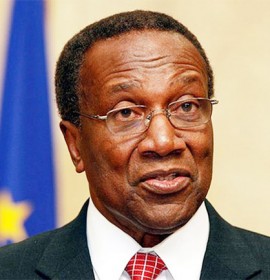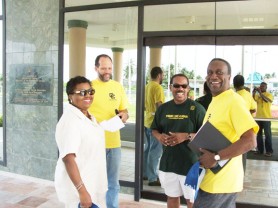Two years before the end of what would have been his fourth five-year term as Secretary General of the Caribbean Community, (CARICOM) Edwin Carrington, the 72 year-old Trinidad and Tobago-born career diplomat, announced that he will step down from what is widely regarded as the foremost and arguably most demanding regional public service assignment, at the end of 2010. Carrington’s announcement of his retirement came less than a month prior to the September 14 death of his son whose prolonged illness must have taken a toll on the Secretary General’s family. Indeed, the Secretary General himself dropped more than a subtle hint of his imminent departure just a few weeks earlier when he told journalists that he had “never come to stay forever.”

When it comes at year end, Edwin Carrington’s departure will mark the conclusion of a career in the service of the Caribbean Community which, in its distinction, at least equals that of any of the long line of regional civil servants who preceded him. An economist by training, his professional service to the Caribbean predates the establishment of the Community itself. Inside the Secretariat he served as Director of Trade and Integration from 1976 before departing the region to assume, first, the office of Deputy Secretary General of the African Caribbean and Pacific (ACP) Group of States, then, and, in 1985, the office of Secretary General. Up to this time Edwin Carrington remains the only Caribbean national to have headed the Brussels-based ACP Secretariat. In 1991, Carrington returned to the region from Brussels to serve as his country’s High Com-missioner to Guyana before his appointment as CARICOM Secretary General the following year. As Secre-tary General of CARICOM he has also served as Head of CARIFORUM
Setting aside the advances which the Community has recorded during Carrington’s tenure as Secretary General, perhaps the most significant of which was the 2007 launch of the Caricom Single Market – which, in the Secretary General’s view is the “most ambitious undertaking” the regional movement has ever undertaken – he personally has much to show for his service to CARICOM and to the Caribbean. Several CARICOM member states have accorded Carrington national awards though he himself conceded in his resignation announcement that his tenure had been a period of both “important achievements as well as significant disappointments,” The “achievements,” most of them at least, have been itemized in the various media reports that have followed the announcement of his resignation.

Perhaps understandably, he has declined, for the moment at least, to disclose his “disappointments.” Those may well be the subject of literary pursuits which he may, perhaps, undertake in retirement though he may well have dropped a less than subtle hint of those disappointments in his address to the thirty-first meeting of Heads in July in Jamaica, declaring that what the region needed was the kind of “guidance and leadership that will channel our energies.” Few, perhaps, will challenge the view that the lack of such guidance and leadership is one of CARICOM’s biggest headaches. The other point to be made, of course, is that the long-serving Caribbean diplomat’s eventual retirement may be further away than one might suspects if Trinidad and Tobago Prime Minister Kamla Persaud-Bissessar persuades him to return directly to the service of his country.
While the outgoing Secretary General has said nothing in his retirement announcement to suggest that he departs on any terms aside from his own, and, moreover, that he felt that eighteen years is long enough, media responses to his announcement have claimed differently, pointing particularly to the timing of the announcement, coming as it did at a time of persistent regional discourse regarding the need to undertake a critical top-down assessment of the CARICOM machinery with a view to undertaking structural changes in its administrative management and decision-making processes. Those kinds of responses were, perhaps, inevitable. It is in the very nature of the job of CARICOM Secretary General that the incumbent is required to be all things to all people. Experienced diplomat that he is, Edwin Carrington would have been aware of the nature of his undertaking and of the vulnerabilities that went with the job.
Long prior to the announcement of his retirement sections of regional opinion had been inclined to link the office of Secretary General to what they regard as operational deficiencies within the Secretariat. More recently, suggestions in the media that change in the management structure of CARICOM should include changing the Secretary General had become more insistent.
During the August 2010 Summit of Heads the Jamaica Observer declared in

an editorial that “the real problem of CARICOM is the comprehensive failure of the management, specifically the leadership of the Secretariat.” Taking direct aim at Carrington the editorial went on to say that “the performance of the CARICOM Secretariat over the last 10 to 15 years has happened on the watch of the current Secretary General and whether it is his fault or not, the record points to the need for a change of leadership.” The editorial added: “His resignation now at the heads of government meeting in Montego Bay, would dramatise the need for a fresh start, without which CARICOM will drift aimlessly on to certain death.”
At the end of the Montego Bay summit the media again took aim at Carrington. Rickey Singh, the veteran Guyanese-born journalist, while acknowledging that Carrington had “faithfully served the region and in the process being awarded national honours from various CARICOM governments,” declared that “It, however, now appears that the Community’s leaders can no longer ignore the reality that the fundamental changes required for a new architecture of governance would also make necessary a successor to Carrington.”
Another Caribbean journalist Guyanese Burt Wilkinson, saw a different angle to Carrington’s announced resignation, writing in an article published in the New York Amsterdam that the Secretary General’s departure may well have been the result of an instance of intra regional subterfuge. Wilkinson wrote that “high-ranking officials who have traveled with Carrington over the years, most recently to last month’s annual (CARICOM Heads) summit” at Montego Bay “had disclosed that Jamaica had played a key role in pushing out Carrington on the grounds that he had “outlived his usefulness.” Jamaica, Wilkinson asserted, has a vested interest in Carrington’s departure and his replacement with its own national, Ransford Smith, the serving Deputy Secretary General of the Commonwealth.
Evidently seeking to quell persistent speculation that Carrington’s decision to demit office may have come under a measure of pressure at least two regional Heads of Government, Prime Minister Bruce Goulding of Jamaica and Prime Minister Tillman Thomas of Grenada appeared to find it necessary to seek the deflect the criticisms that have been leveled at him. Thomas was the more direct of the two, asserting in a public comment that the serious failings of the regional movement have their roots in a deep-seated and enduring lack of political will on the part of individual member states that has been with us long before Carrington was given the job as Secretary General.
It took the Jamaica Gleaner, however, to state more bluntly that to “lay all the blame for CARICOM’s weaknesses and failings at the door of the Secretary General” would be to do “a grave disservice to Mr. Carrington.” Nor, the Gleaner pointed, would it be fair “to attempt to belittle the institutional advances of CARICOM under Mr. Carrington’s watch.” CARICOM’s woes, the editorial asserted are, in the main, a function of “the failure of its political leadership.” Going, perhaps to the heart of CARICOM’s troubles the Gleaner editorial declared that “a single market and policy coordination organization like CARICOM demands predictable implementation of agreed action and the absence of second-guessing by a single member or group of members in response to the domestic constituencies. This presumes a ceding of some sovereign authority to a supranational centre, as has been achieved by the European Union (EU) and was contemplated by Sir Shridath Ramphal’s group. Regional leaders have been afraid to move in this direction.””
For all the prestige and public attention that goes with the position of Secretary General, the incumbent remains the servant of a Board of Directors, CARICOM Heads of Government, whom, all to often, appear deeply at odds with themselves and decidedly uncertain about the direction in which the regional movement should go. One consequence of this has been an indifference to CARICOM by Caribbean people, region-wide, not so much over the pace of the regional integration process – which not all Caribbean people favour anyway – but more as a result of a feeling that the cost of sustaining the institution has, at least up until now, far outweighed the returns. At another level, failure to implement the decisions taken by CARICOM is considered to be its biggest failing and that, is felt, is far more a function of differences of opinion among the Heads than any deficiency on the part of the Secretary General.
In the wake of Carrington’s announcement of his retirement the search for another whipping boy, has already begun with all of the familiar insular jockeying among member states to have the position filled with their own candidate. The Jamaican Ransford Smith’s nomination reportedly has the backing of the government in Kingston though another of Smith’s countrymen, serving Cabinet Secretary Douglas Saunders has been mentioned as a possible candidate for the position. Other names that have surfaced, including those of the Dominican-born former Deputy Secretary General Irwin La Reque, Dr. Kersha Harkasingh of Trinidad and Tobago and the Surinamese diplomat Albert Ramdin, the serving Assistant Secretary of the Organization of American states suggests that the member state with the most effective lobby rather than the candidate with the best credentials may eventually assume the position. Indeed, a senior official of the Organization of Eastern Caribbean States (OECS) the grouping comprising the smaller member states of CARICOM has already called on the sub-region to “to ensure that our sub-regional intellectuals and statesmen are given an equal chance to serve and not be relegated to the back waters”
Beyond the lobbying on the grounds of nationalism a section of the regional media has even sought to tender a re-designed “job description for the position of CARICOM Secretary General. The Jamaica Observer (August 8) rules out a Jamaican national on the grounds that “Jamaicans now head several regional institutions” and seeks to make a case for an OECS national and a woman. It also disqualifies “technocrats and bureaucrats from regional organizations” and persons “currently in the CARICOM Secretariat or retired from it.” No one in the latter group, it says, “has the ability or credibility to become Secretary General because of their culpability for the failures of the out-going administration.” Not only does The Jamaica Observer call for “an outsider” to replace Carrington but one who is “unencumbered by loyalties to existing senior staff since they will have to be quickly replaced.” The Observer editorial is not alone in the suggestion that the senior functionaries who served under Mr. Carrington should depart the Secretariat with him. The editorial raises too the consideration of age, calling for a Secretary General “in their 40’s………..in his or her mental or physical prime,” and prescribes “a term limit of 10 years.
Whether or not the search team for a new Secretary General will feel that it must take these myriad recommendations into consideration is difficult to tell. What is certain is that whoever succeeds Mr Carrington will feel the same constricting effects of serving a collection of regional heads who, more often than not are at odds over the way in which CARICOM should function. Some, arguably, and based on public comments which they have made, may even have become entirely indifferent to the idea of a regional integration movement, preoccupied as they are with their own domestic difficulties. However anxious Mr. Carrington’s critics may be to see the back of him, his successor, in the fullness of time may well share the same fate. The success of the regional movement depends entirely on an enabling political will which only CARICOM Heads can provide and whoever succeeds Carrington will, like him, inevitably have to live with the difficulties that derive from that absence of will. The risk of having to take responsibility for failings that were never of their doing in the first place will remain an occupational hazard of the job of CARICOM Secretary General.
The constraints that inhere in the very nature of his office did not, altogether, prevent a significant measure of accomplishment for the regional movement during his tenure. As the Secretariat correctly pointed out in a statement released in the wake of the announcement of his intended December 31 resignation, it is under Edwin Carrington’s stewardship that “the platform is being set for the eventual evolution of the Community into a Single Economy.” For all the halting movement towards this objective – a circumstance that is attributable to the enduring insularity of member states rather than to anything that can be linked to the Secretary General’s leadership – this is a considerable achievement. Carrington’s term has also coincided with the establishment of a number of key regional institutions including the Trinidad-based Caribbean Court of Justice (CCJ); the Caribbean Regional Organisation for Standards and Quality (CROSQ -2002); the Caribbean Community Climate Change Centre (CCCCC) the CARICOM Competi-tion Commission and the CARICOM Development Fund (CDF). These are not accomplishments that can be wished away.




